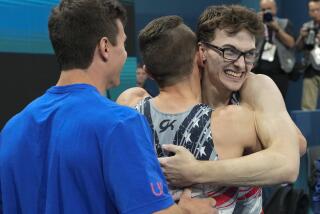For Olympic Gold Medalist Gorski, Magic Moment Will Live Forever
- Share via
SAN DIEGO — No matter how long Mark Gorski lives, that magic moment will be with him.
During that moment, Gorski was cycling around the track at Cal State Dominguez Hills, just outside Los Angeles, proudly waving an American flag.
And, he had reason to be proud. Gorski had just become the first American ever to win an Olympic gold medal in match sprint cycling on that memorable summer day of 1984.
“I’ll never forget it,” Gorski said. “When I’m 70, I’ll still remember it as if it happened yesterday.”
“Yesterday” was eight months ago for the 25-year-old Gorski, but people certainly haven’t forgotten him. He still receives numerous calls to promote cycling, such as Wednesday’s appearance at a press conference for the April 21 Bud Light La Jolla Grand Prix.
Since the Olympics, Gorski has performed numerous advertising duties for companies and has turned down several others. He is also the spokesman for the National Arthritis Foundation.
“Obviously, my life has become much different since the Olympics,” he said. “It used to be that I would train and make an occasional appearance. Now, I want to do what I can to help the sport grow. There haven’t been any cycling heroes before in the United States. I don’t think we are abusing the publicity. We’re taking time to do this so the sport will go forward.”
Gorski describes himself as a quiet family man from Indianapolis. He has a wife, Mary, and 22-month-old son, Alexander.
But the limelight stemming from the Olympics has caused the quiet family man to take center stage for a while.
“I like to think I’m still the same old regular guy,” Gorski said. “But people tend to treat you differently. I think they think you are a different person because you are treated like you are special. I don’t like to feel that way.”
Actually, Gorski said he can still go to public places without being recognized.
It’s a different story when racing fans are involved. He said he receives about five letters a week requesting autographs from locations such as Germany, France and Italy, where cycling has gained much more notoriety.
Even at home, Gorski is popular among cycling enthusiasts. At a recent bicycle trade show in New York, he signed autographs nonstop for nearly four hours.
“I enjoy the attention to a point,” he said. “Then, it gets to be a lot of work. For instance, I tried to be nice to everyone at the show in New York. After three or four hours, it gets hard to be as nice as you’d like to be to everyone. It gets tiring.”
Lately, Gorski has grown tired of hearing about the blood doping controversy involving U.S. cyclists.
He admitted he was asked about participating in the doping, which helped build the riders’ endurance. Gorski said that although he refused to get involved, he assumed others would. He said he never saw anybody actually take part in the doping.
“Endurance would only be a small advantage for a sprinter,” he said. “There was no reason for me to do it.”
Although the recent controversy has overshadowed the glory of the U.S. cycling team, Gorski said it will never take away from his accomplishment.
His biggest disappointment, in fact, is that the Soviet Union and East Germany were among the countries boycotting the 1984 Games. They are considered to have the world’s best cyclists.
Three months before the Olympics, Gorski had beaten world champion Sergei Kopylov of the Soviet Union in races at the Soviet Union and Czechoslovakia.
Gorski originally had been seeded third for the Olympics. But he became the top seed after the Soviets and East Germans pulled out.
“More than any other cyclist, I was competitive with the East Germans and Russians,” Gorski said. “I would’ve been a medalist, regardless of the boycott. I was in the Soviet Union when they announced their boycott, and it left me standing there. The Russians were one of the motivating factors for me to train so hard. I had defeated the Russian in the Soviet Union, but I think it would’ve been easier in Los Angeles.”
Gorski and Kopylov did not meet in the 1980 Olympics because of the U.S. boycott. Maybe both countries will attend the 1988 Olympics so the long-awaited showdown will occur.
That motivating factor already has Gorski training hard--except when promotional appearances dictate otherwise.
More to Read
Go beyond the scoreboard
Get the latest on L.A.'s teams in the daily Sports Report newsletter.
You may occasionally receive promotional content from the Los Angeles Times.






